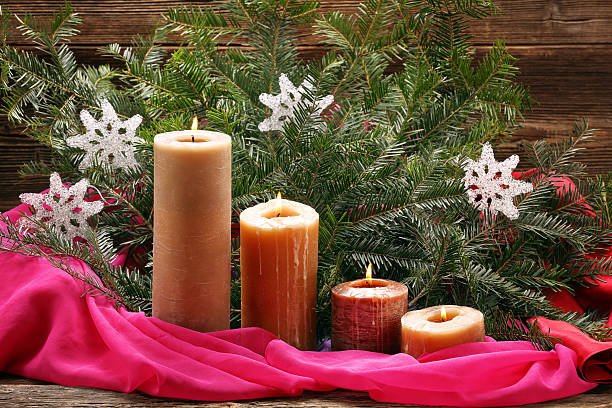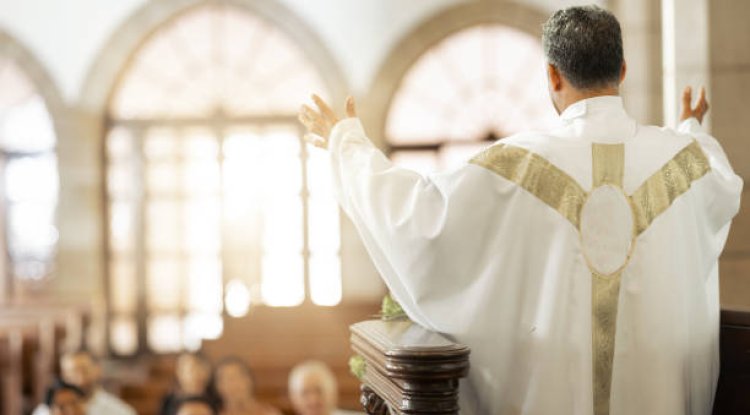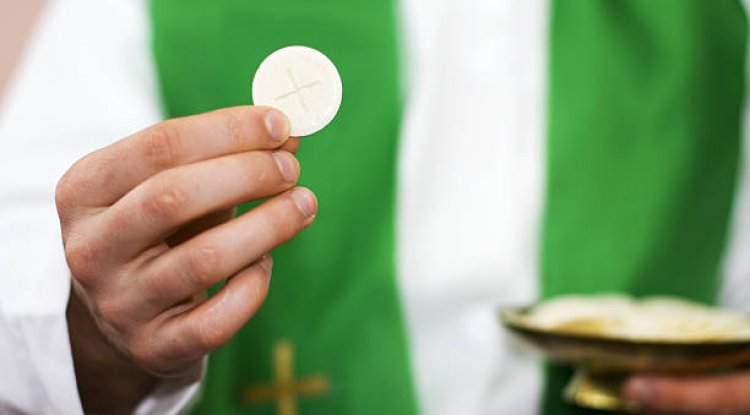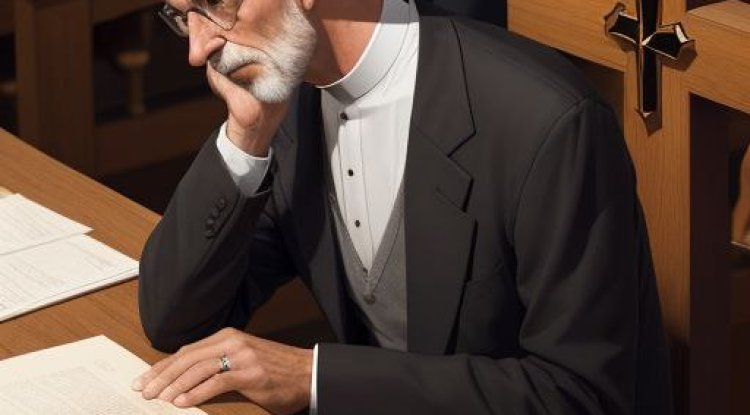THE ANGEL’S CANDLE: A SYMBOL OF LOVE
HOMILY FOR FOURTH SUNDAY OF ADVENT, YEAR B. (Readings: 2 Samuel 7:1-5.8-12.14-16; Psalm 89; Romans 16:25-27 and Luke 1:26-38).

As we approach the end of the season of Advent, we recall it is divided in to two parts: (from the 1st Sunday to the 16th of December, and from the 17th to 24th December). We remember the three dimensions of Christ’s coming: in incarnation, through the sacraments and His coming in majesty at the end of time. While the first part of advent focused on his coming in majesty, the second part emphasizes His incarnation. On this day the Church lit the fourth Advent Candle known as the “Angel’s Candle.” It symbolizes God’s love for humanity that he gave us his only Son, which helps us to reflect on the Angel’s visit to Mary, known as the Annunciation and She as the Ark of the New Covenant.
In the first reading, the striking words of David to Nathan the prophet that catches my attention. He said, “See now, I dwell in a house of cedar, but the ark of God dwells in a tent” (2Sam 7:2). Cedar tree/wood are expensively valued. This means David lived in an expensive, beautiful home. When he remembered that the Ark of God dwells inside tent curtains, the contrast bothered him. He was troubled that he lived in a nicer house than the Ark of the Covenant. Without being specific, he wanted to build a Temple (to replace the tabernacle). Even when God did not ask, he wanted to do something for God. Nathan also gave a beautiful response to David, he said, “Go, do all that is in your heart; for the Lord is with you” (v.3). He said this to David because it seemed good and reasonable. To do all that is in your heart shows that David’s heart is filled with this question, “What can I do for God?” David was so filled with gratitude for God’s glory and he wanted to do something special. While David was concerned about this, God made a promise to him saying, “I will raise up your offspring after you, who shall come forth from your body, and I will establish his kingdom… Your throne shall be established forever” (2Sam. 7:12). This indicates the lineage of Mary and the genealogy of Christ.
Again, when David said, “I dwell in a house of cedar,” it symbolizes the tree of Mary. Cedar is a tree planted by God in (Isaiah 41:19; Psalm 104:16). The Bible describes the cedar tree as strong and extremely durable (Isaiah 9:10), graceful, beautiful and spreading wide (Psalm 80:10-11); the cedar tree is high and tall (Amos 2:9, Ezekiel 17:22), which is a symbol of Mary’s considerable spiritual stature, excellent and human perfection in God. Its fragrance is like the scent of Lebanon (Song of Songs 4:11). Researchers tell us that the fragrance and oil of the cedar tree repels and destroys snakes, which is a symbol of evil. Similarly, Mary crushes the head of serpent (Gen. 3:15), protects the Church and its message against heresy. The cedar tree is known for its longevity and resistance to decay. Similarly, Mary’s sinlessness is an expression of immortality and absence of bodily degeneration.
Practically, David’s feelings are a common phenomenon in the region of Mato Grosso in Brazil, where I had my early missionary experience as a priest. The people generally live-in wooden buildings, or as we call it “pako house,” in our local parlance, even the parish house is made of wood. So, it was a common phenomenon to have a simple Tabernacles made of wood as the dwelling place of God. It won’t be right when we live in castles, duplex, flats or other mighty structures and relegate God or the things of God to the lowest of qualities. If we can give the best to our homes, what about the house of God, the dwelling place of God? We are to give God the best or at least, something commeasurable with the society.
At the visit of the angel to Mary in the gospel of today, she became the Ark of the Covenant, where God dwells. It is a revelation of the hidden mystery of the old covenant in the new. The message of the angel becomes a fulfillment of the promise of God to David. The angel said to her, “Hail, full of grace, the Lord is with you… Do not be afraid Mary for you have found favour with God. And behold, you will conceive in your womb and bear a Son, and you shall call his name Jesus. He will be great and be called the Son of the Most High; and the Lord God will give to him the throne of his father David, and he will reign over the house of Jacob forever; and of his kingdom, there will be no end” (Lk.1:30-33). Mary is outstanding in the history of salvation as is so clear in today’s liturgy. Her humility cannot be overemphasized, she expressed her feelings saying, “Behold, I am the handmaid of the Lord; let it be to me according to your word” (Lk. 1:38).
In the second reading, St. Paul reveals the fact that Christ is the mystery that was kept hidden for long ages. Christ is the fulfillment of the promise God made to David; a mystery God concealed in the old covenant. Paul’s message prepares us towards the incarnation of God’s word, that is Christmas, which is so close at hand and defines the second part of Advent, 17th to 24th December.
In a nutshell, as we prepare to welcome Christ, like David, our house can be a point of reflection for us this week. It’s not just the physical decorations of Christmas that we need. With our human concept of house, there is always an entrance to the house, which also serves as exit. The house is a place of rest, a place of comfort, a place of protection and so many other characteristics of the house. Importantly, the house in theological concept signifies our hearts, where God comes in and dwell, remembering how Zacchaeus welcomed Christ into his house (Lk 19:1-10). The love of God expressed through the Angel’s Candle is for sinners to repent and have their hearts prepared to welcome Christ.
Happy Sunday!
Fr. Ken Dogbo, OSJ
What's Your Reaction?



















